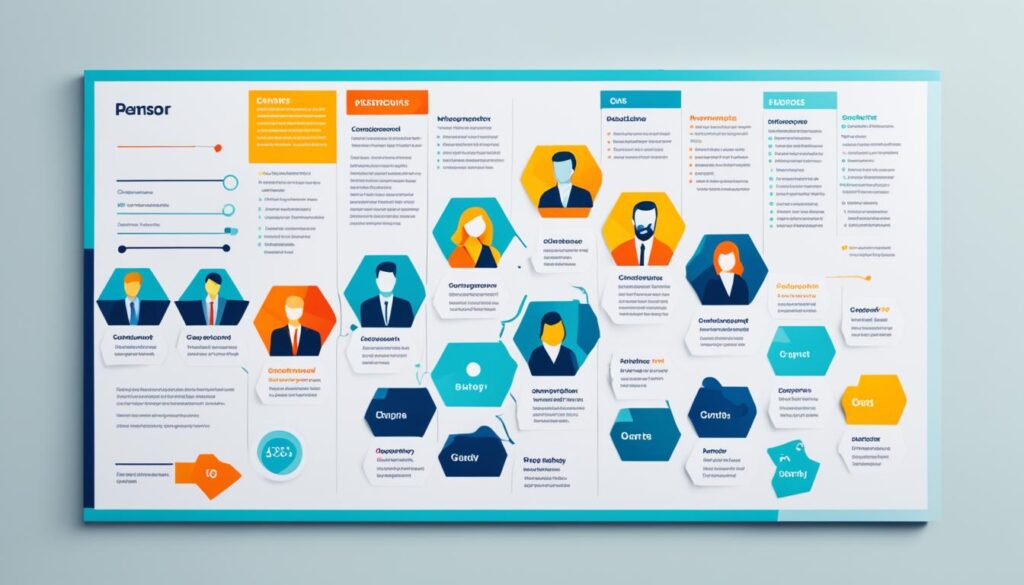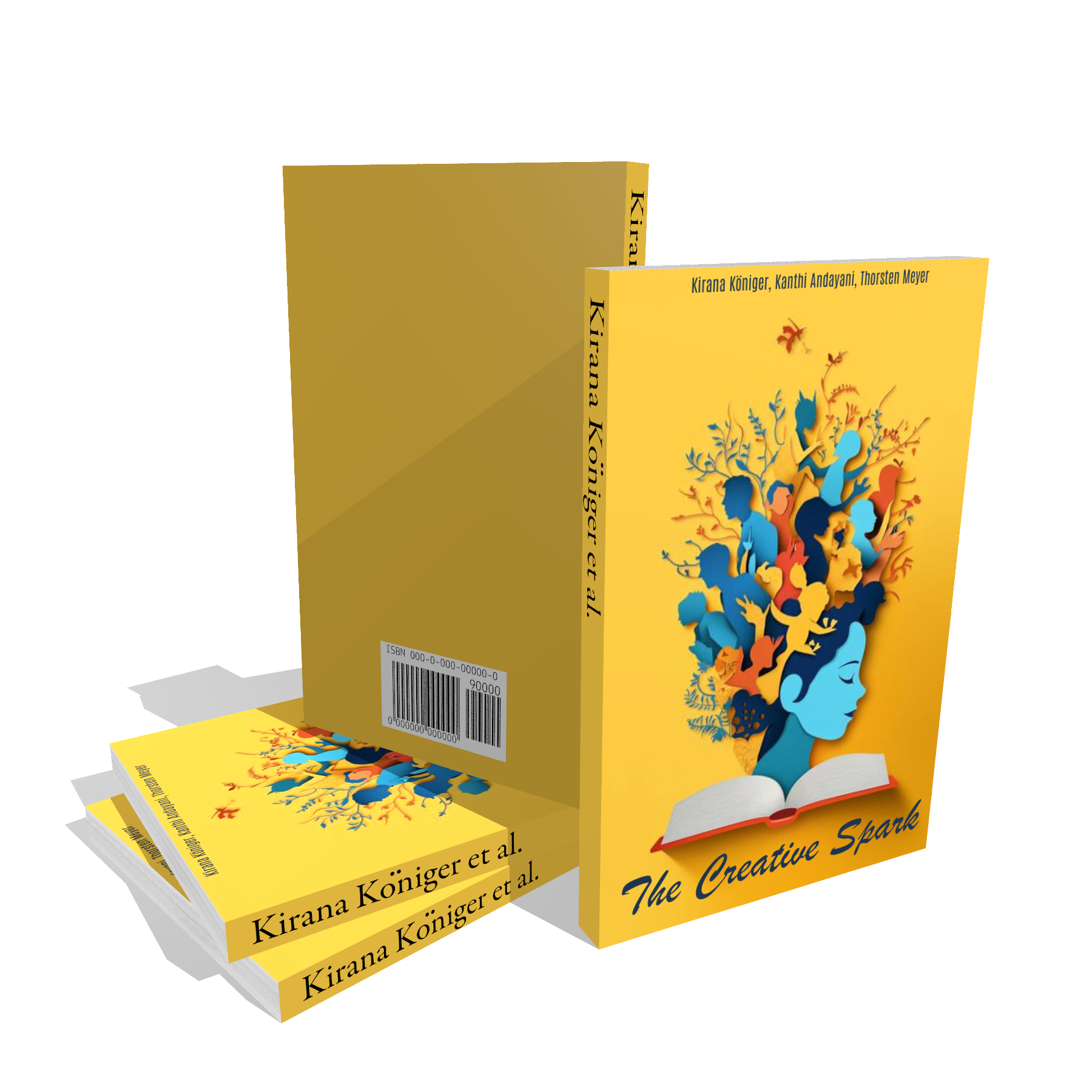Understanding your target audience is crucial for the success of your marketing efforts. Creating detailed and impactful buyer personas is essential for this purpose. By developing a buyer persona, you are essentially creating a detailed profile of your ideal customers, enabling you to tailor your marketing strategies and messaging to suit their specific needs and preferences. So, what steps should you follow to define your buyer persona?
To help you in this process, we’ve compiled a list of essential questions that you must ask when building your buyer persona. These questions will provide you with valuable insights into your target audience’s demographics, needs, values, pain points, and consumption habits. By asking the right questions, you can create buyer personas that serve as valuable guides for your marketing efforts, ultimately driving better results.
Key Takeaways:
- Defining your buyer persona is crucial for tailoring your marketing strategies to the needs and preferences of your ideal customers.
- Asking essential questions about demographics, needs, values, pain points, and consumption habits will help you build accurate and effective buyer personas.
- By creating detailed buyer personas, you can guide your marketing efforts and drive better results.
- Building buyer personas is an ongoing process that should be revisited and refined as your business evolves.
- Utilize the insights gained from your buyer personas to optimize your marketing strategies and create personalized experiences that resonate with your ideal customers.
Understanding the Concept of a Buyer Persona
A buyer persona is a fictional representation of your ideal customer. It is created based on research and data about your target audience, including their demographics, preferences, behaviors, and pain points. Buyer personas are crucial in B2B marketing as they allow you to understand and connect with your target customers on a deeper level.
They shape your content marketing strategies by helping you create relevant and personalized content that resonates with your audience. By understanding the specific needs and challenges of your ideal customers, you can tailor your marketing messages to address their pain points and provide solutions that meet their expectations.
It is important to differentiate between a buyer persona and a target audience. A target audience refers to a broad group of people who may have similar characteristics or needs, while a buyer persona is a specific and detailed representation of an individual customer. With a buyer persona, you can go beyond demographics and gain insights into their motivations, goals, and preferences.
Think of a buyer persona as a semi-fictional portrait of your ideal customer. It goes beyond general demographics and provides valuable insights and guidance for your marketing efforts. By understanding your buyer persona, you can refine your marketing strategies, improve your messaging, and create a more personalized experience for your ideal customers.
What is a Buyer Persona?
A buyer persona is a fictional representation of your ideal customer. It takes into account their demographics, behaviors, preferences, and pain points to create a detailed portrait of who they are. It helps you understand their needs, motivations, and challenges, allowing you to tailor your marketing strategies to effectively reach and engage them.
The Relevance of Developing Buyer Personas in B2B Marketing
Developing buyer personas is essential in B2B marketing as it helps you understand your target customers on a deeper level. By knowing their specific needs, pain points, and preferences, you can create targeted marketing campaigns that resonate with them. Buyer personas also enable you to align your messaging and content with their decision-making process, improving the effectiveness of your marketing efforts.
How Buyer Personas Shape Content Marketing Strategies
Buyer personas play a crucial role in shaping content marketing strategies. They provide insights into your target customers’ preferences, interests, and challenges, guiding the creation of relevant and engaging content. By understanding their needs and motivations, you can develop content that answers their questions, solves their problems, and builds trust, ultimately driving conversions and customer loyalty.
Understanding Buyer Persona VS Target Audience
While a target audience refers to a broad group of people who share common characteristics or needs, a buyer persona goes beyond demographics to provide a detailed representation of an individual customer. Buyer personas focus on the specific motivations, behaviors, and preferences of your ideal customers, allowing you to create more personalized and effective marketing strategies.
Buyer Persona: More Than a Semi-fictional Portrait of an Ideal Customer
A buyer persona is more than just a semi-fictional portrait. It provides valuable insights and guidance for your marketing efforts. By understanding your ideal customers in detail, you can create targeted marketing campaigns, improve your messaging, and deliver personalized experiences that resonate with your audience. Developing accurate buyer personas is an ongoing process that requires research, data analysis, and continuous refinement to ensure your marketing efforts remain relevant and effective.
Key Questions to Inquire when Creating Buyer Personas
When creating buyer personas, it is important to ask specific key questions that will provide you with the necessary information to develop accurate and effective profiles of your target customers. These questions will help you understand their demographics, job titles and roles, typical daily routines, pain points, and decision-making processes. By gaining insights into these aspects, you can tailor your marketing strategies to better meet the needs and preferences of your ideal customers, ultimately driving better results for your business.
Demographic Questions to Develop a Buyer Persona
Asking demographic questions is essential for developing a comprehensive buyer persona. These questions help you understand the basic characteristics of your target customers, such as their age, gender, location, education, and income. By gathering this information, you can create more accurate and targeted buyer personas that align with the specific demographics of your ideal customers.
Decoding the Buyer’s Job Title and Role
Understanding the job title and role of your target customers is crucial for tailoring your marketing efforts effectively. By decoding their job titles and roles, you can gain insights into their professional responsibilities and challenges. This information will help you position your product or service as a solution that addresses their work-related pain points, ultimately increasing the likelihood of conversion.
Inquiring About A Buyer’s Typical Day
Asking about a buyer’s typical day provides valuable insights into their routines, priorities, and the context in which they might encounter your marketing messages. Understanding their daily lives will help you determine the best times and channels to reach them with your tailored marketing campaigns. By aligning your messaging with their daily activities, you can increase engagement and capture their attention more effectively.
Understanding the Buyer Persona’s Pain Points
Gaining a deep understanding of the pain points that your buyer personas experience is crucial for positioning your product or service as a solution. By addressing their specific needs and pain points, you can create targeted marketing messages that resonate with your ideal customers. This understanding will help you craft relevant content, provide personalized experiences, and ultimately drive higher conversions.
Exploring the Buyer’s Decision-making Process
Understanding the factors that influence your buyer personas’ decision-making process is key to creating effective marketing strategies. By exploring their decision-making journey, you can identify the touchpoints where your product or service can make the most impact. This information will guide your messaging and enable you to tailor your marketing efforts to address their specific decision-making criteria, increasing the likelihood of conversion.

| Key Questions for Creating Buyer Personas | Relevant Information |
|---|---|
| Demographic Questions | Age, gender, location, education, income |
| Buyer’s Job Title and Role | Professional responsibilities, work-related challenges |
| Buyer’s Typical Day | Routines, priorities, context of encountering marketing messages |
| Buyer Persona’s Pain Points | Specific needs, challenges, pain points |
| Buyer’s Decision-making Process | Factors influencing purchasing decisions |
The Role of Persona Interview in Buyer Persona Creation
Persona interviews play a crucial role in the creation of accurate and effective buyer personas. Conducting a productive buyer persona interview involves asking the right questions and actively listening to the responses. By engaging in direct conversations with your target audience, you can uncover valuable insights that will inform your marketing strategies and campaigns.
Conducting a Productive Buyer Persona Interview
When conducting a buyer persona interview, it’s important to create a comfortable and open environment that encourages honest and detailed responses. Make sure to establish rapport with the interviewee and provide clear instructions to ensure the interview flows smoothly. Actively listen to their answers, asking follow-up questions to dig deeper into their thoughts and experiences.
Selecting the Right Interview Questions for Buyer Persona Creation
Choosing the right interview questions is essential to gather the information needed to develop a comprehensive buyer persona. Tailor your questions to address key aspects such as demographics, preferences, pain points, and shopping habits. Use open-ended questions that require detailed responses to gain deeper insights into your target audience’s motivations and behaviors.
Tailoring the Persona Interview to Fit the Sales and Marketing Goals
Aligning the persona interview with the goals of both the sales and marketing teams is crucial for utilizing the buyer personas effectively. Coordinate with both teams to determine the specific information they require to guide their strategies and tactics. This ensures that the buyer personas created through the interview process will cater to the unique needs of each team, resulting in more targeted and impactful marketing efforts.
Understanding Your Buyer’s Preferences and Shopping Habits
During the persona interview, delve into the preferences and shopping habits of your target audience. Gain insights into their preferred communication channels, shopping platforms, and decision-making criteria. Understanding these details enables you to tailor your marketing campaigns to meet their needs and provide a personalized experience that resonates with them.

Involving the Sales Team in the Persona Interview
The sales team plays a crucial role in understanding the buyer persona’s perspective, as they interact directly with potential customers on a daily basis. Involving the sales team in the persona interview process allows them to provide valuable insights and anecdotes that further enhance the accuracy and effectiveness of the buyer personas. Their input can help bridge the gap between marketing strategies and actual sales interactions, leading to more effective sales enablement and customer engagement.
Buyer Persona Templates: A Handy Tool in Persona Development
When it comes to persona development, buyer persona templates are invaluable assets. These templates provide a structured framework for capturing and organizing information about your ideal customers, ensuring consistency and thoroughness in the persona creation process.
Finding the best buyer persona templates is essential to maximize the effectiveness of your marketing efforts. When evaluating templates, consider factors such as customization options, completeness, and ease of use. Look for templates that allow you to capture comprehensive data about your target audience, including demographics, preferences, pain points, and decision-making processes.
Using buyer persona templates can significantly improve your marketing plans. They provide actionable insights into your customers’ needs, desires, and behaviors, helping you make informed decisions about your marketing strategies. By utilizing these templates, you can create more targeted and personalized campaigns that resonate with your ideal customers.
The role of the marketing team in using buyer persona templates cannot be overstated. They are responsible for implementing the insights gained from the personas into marketing strategies, ensuring that the messaging, content, and tactics align with the identified buyer personas.
Buyer persona templates also have a strong connection with inbound marketing. By tailoring your content to the specific interests and pain points of your buyer personas, you can attract the right audience and increase engagement. These templates serve as a guide for creating content that appeals directly to your ideal customers, maximizing the impact of your inbound marketing efforts.

Using buyer persona templates streamlines the persona development process and empowers your marketing team to create targeted and impactful campaigns. By leveraging these templates, you can gain a deeper understanding of your customers and deliver marketing messages that resonate with their needs and desires.
Drawing Insights from Buyers’ Consume Information to Amplify Marketing Efforts
When it comes to amplifying your marketing efforts, drawing insights from how buyers consume information is crucial. In the digital age, digital marketing provides valuable data on customer behavior, preferences, and engagement. By understanding how customers consume information, you can tailor your content marketing strategy to deliver the right message through the right channels, maximizing your impact.
Using Digital Marketing to Understand How Customers Consume Information
Digital marketing offers a wealth of information about customer behavior. By analyzing website analytics, social media engagement, email open rates, and other digital metrics, you can gain valuable insights into how customers interact with your content. This understanding allows you to optimize your marketing efforts and deliver targeted messages to the right audience at the right time.
How Buyer Persona Helps Tailor Content Marketing Strategy
A buyer persona is an invaluable tool in tailoring your content marketing strategy. By understanding your target audience’s preferences, pain points, and interests, you can create content that resonates with them. A well-defined buyer persona enables you to craft personalized messages that address their specific needs, increasing the effectiveness of your marketing campaigns.
By aligning your content with your buyer persona, you can attract and engage the right audience, driving higher conversion rates and customer satisfaction.
Finding Out What’s Most Important to Your Customers
Understanding what is most important to your customers is essential to prioritize your marketing efforts. By analyzing customer feedback, conducting surveys, and studying customer behavior, you can uncover their preferences, desires, and pain points. This knowledge allows you to focus your marketing efforts on addressing their most pressing needs, increasing customer satisfaction and loyalty.
How to Utilize these Insights in a Marketing Campaign
Utilizing these insights in a marketing campaign involves crafting targeted messages, creating personalized experiences, and implementing effective strategies. Armed with a deep understanding of your customers, you can tailor your marketing collateral, such as emails, social media posts, and landing pages, to resonate with their interests and needs. By delivering the right message to the right audience, you can increase engagement, drive conversions, and build lasting relationships with your customers.
Nurturing the Marketer and Buyer Persona’s Relationship through Understanding Shopping Preferences
A key aspect of utilizing insights from buyer personas is understanding your customers’ shopping preferences. By analyzing their behaviors and preferences during the purchasing process, you can optimize your marketing strategies to meet their needs. Whether it’s providing a seamless online shopping experience, offering personalized product recommendations, or tailoring promotions to their preferences, nurturing the relationship between the marketer and the buyer persona leads to higher engagement and increased conversions.

| No | Shopping Preference | Percentage |
|---|---|---|
| 1 | Online Shopping | 75% |
| 2 | In-Store Shopping | 20% |
| 3 | Mobile Shopping | 5% |
Conclusion
In conclusion, building effective buyer personas is a crucial step in optimizing your marketing strategies. By asking essential questions, conducting persona interviews, and utilizing buyer persona templates, you can gain valuable insights into your target audience. Understanding their demographics, preferences, pain points, and decision-making process allows you to create personalized experiences that resonate with your ideal customers.
It is important to remember that developing buyer personas is an ongoing process. As your business evolves and your target audience changes, it is essential to revisit and refine your buyer personas. By continuously updating and refining your buyer personas, you can ensure that your marketing efforts remain relevant and effective.
Building effective buyer personas empowers you to optimize your marketing strategies, attract the right audience, and drive better results. By understanding your customers on a deeper level, you can create targeted content, personalized experiences, and impactful marketing campaigns. Start building your buyer personas today and unlock the potential for long-term success.
FAQ
What are the essential questions to ask when building your buyer persona?
The essential questions to ask when building your buyer persona include demographics, job title and role, typical day, pain points, and decision-making process.
What is a buyer persona?
A buyer persona is a fictional representation of your ideal customer, created based on research and data about your target audience.
Why is developing buyer personas relevant in B2B marketing?
Developing buyer personas is relevant in B2B marketing as it allows you to understand and connect with your target customers on a deeper level.
How do buyer personas shape content marketing strategies?
Buyer personas shape content marketing strategies by helping you create relevant and personalized content that resonates with your target audience.
What is the difference between a buyer persona and a target audience?
A target audience refers to a broad group of people, while a buyer persona is a specific and detailed representation of an individual customer.
How is a buyer persona more than just a semi-fictional portrait of an ideal customer?
A buyer persona provides valuable insights and guidance for your marketing efforts, based on real data and research about your target audience.
What are the key questions to inquire when creating buyer personas?
The key questions to inquire when creating buyer personas include demographic questions, decoding the buyer’s job title and role, understanding their typical day, identifying their pain points, and exploring their decision-making process.
How do persona interviews play a role in buyer persona creation?
Persona interviews help gather the necessary information to develop accurate and effective buyer personas. They involve asking the right questions and actively listening to the responses.
Why is it important to involve the sales team in the persona interview process?
Involving the sales team in the persona interview process provides valuable insights, as they have direct contact with customers and can contribute their firsthand knowledge.
How do buyer persona templates assist in persona development?
Buyer persona templates provide a structured framework for capturing and organizing information about your ideal customers, ensuring consistency and thoroughness in the persona creation process.
Why should you use buyer persona templates?
Using buyer persona templates helps improve marketing plans by providing actionable insights and guiding decision-making based on a deeper understanding of your target audience.
How can you draw insights from buyers’ consumption of information to amplify marketing efforts?
By understanding how buyers consume information through digital marketing, you can tailor your content marketing strategy to deliver the right message through the right channels.
Why is it important to find out what’s most important to your customers?
Finding out what’s most important to your customers allows you to prioritize your marketing efforts and align them with their needs and desires.
How can you utilize insights from buyers’ consumption of information in a marketing campaign?
You can utilize insights from buyers’ consumption of information by crafting targeted messages, creating personalized experiences, and implementing effective strategies that resonate with your target audience.
How does understanding shopping preferences contribute to nurturing the marketer and buyer persona’s relationship?
Understanding shopping preferences strengthens the connection between the brand and the customer, leading to higher engagement and increased conversions.
Q: What are buyer persona questions?
A: Buyer persona questions are inquiries used to develop a detailed understanding of the target customer or audience for a business. These questions help in creating a fictional representation of the ideal customer to guide marketing and sales strategies.
Q: Why are buyer persona questions important for marketing plans?
A: Buyer persona questions are crucial for marketing plans as they provide insights into the customer’s core needs, challenges, and behaviors. This information helps in tailoring marketing strategies to better resonate with the target audience.
Q: What are some recommended buyer persona questions to ask when developing marketing strategies?
A: Some recommended buyer persona questions to ask when developing marketing strategies include inquiries about the customer’s demographics, online behavior, purchasing motivations, and pain points. These questions aid in creating effective marketing plans.
Q: How can marketing teams use buyer persona questions?
A: Marketing teams can use buyer persona questions to gain a thorough understanding of their target audience, thereby enabling them to tailor content, messaging, and communication channels to better connect with potential customers.
How Can Understanding Buyer Personas Help in Crafting a Unique Selling Proposition?
Understanding buyer personas can immensely help in crafting a compelling USP. By knowing the needs, challenges, and motivations of your target audience, you can tailor your unique selling proposition to resonate with them. This approach can set your brand apart and attract more potential customers.
Q: What is the significance of asking questions to create a buyer persona?
A: Asking questions to create a buyer persona is significant as it allows businesses to understand their target customers’ needs, preferences, and challenges. This understanding is essential for developing targeted marketing and sales strategies.
Q: Why is it important to ask questions to define the ideal buyer persona?
A: It is important to ask questions to define the ideal buyer persona because doing so provides a deeper understanding of the customer’s motivations, interests, and pain points, which in turn helps in tailoring business strategies to better meet customer needs.
Q: What questions should be asked about an existing customer base when developing buyer personas?
A: When developing buyer personas, questions about the existing customer base should focus on their purchasing behavior, preferences, feedback, and satisfaction with the products or services offered by the business.
Q: How can buyer persona questions help in understanding your target customers?
A: Buyer persona questions can help in understanding target customers by providing insights into their goals, challenges, decision-making process, and preferred communication channels. This understanding enables businesses to better connect with their audience.
Q: What role do buyer persona questions play in creating effective marketing and sales strategies?
A: Buyer persona questions play a crucial role in creating effective marketing and sales strategies by providing a clear understanding of the customer’s needs and preferences. This understanding allows businesses to tailor their strategies to help customers achieve their goals.
Q: How can businesses use buyer persona questions to tailor their content for different social media platforms?
A: Businesses can use buyer persona questions to tailor their content for different social media platforms by understanding the preferences and behaviors of their target audience on each platform. This understanding enables businesses to create content that resonates with specific audiences.










